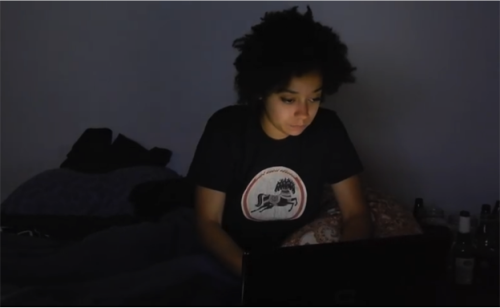This is a guest post by Aph Ko.
I am the actress, writer, and producer for the new independent web-series called Black Feminist Blogger. The show centers on the protagonist Latoya as she attempts to navigate the competitive terrain of the online feminist blogging marketplace.
She is a full-time blogger for the online feminist magazine Sapphire Mouth Magazine, which is run by a white woman named Marie. The show comically highlights some current issues within blogging culture such as the exploitation of writers, the overwhelming amount of under-paid writing positions, as well as the overt privileging of white women’s voices over minoritized women.
As the show unfolds, we see all aspects of Latoya’s life impacted by the massive amount of time she spends online catering to Marie’s requests for more sanitized, mainstream, “page-clicky,” commercial material. From not receiving regular paychecks, to having relationships fall apart, Latoya’s world spins upside down as she attempts to find a way to balance her love for feminism and writing, with the exploitative market inherent in many blogging spaces.
The struggles that Latoya faces are not all that different from many other bloggers online. Blogging is still largely seen as a hobby rather than a business, therefore, exploitation runs wild. Additionally, because so much of the labor is invisible to the mainstream, there are rarely any entertainment products that cater to bloggers. The blogosphere functions much like any other workspace, except much of the communication is done online. There are so many funny narratives lurking “behind the scenes” of blogging and I decided that I would start with some of my own stories.
I think it’s important that young women of color pick up cameras and film their own narratives, regardless if you don’t have a budget or camera experience. Hollywood shouldn’t have a monopoly on creativity and expression. I’m so tired of going to movie theaters or turning on Netflix and seeing that white people (predominantly men) dominate all stories. It’s not right, and frankly, it’s boring as hell.
When you only share narratives from a small percentage of the population, chances are the stories might start to overlap. Only allowing a certain group of people access to representation is merely a way of securing total domination, and normalizing white supremacy. This trend is especially common in the comedy space.
A lot of comedy today is politically, critically, and intellectually bankrupt.
Even when the media product is supposedly “progressive,” it still centers whiteness. Think about the Colbert Report or The Daily Show, where they say some of the most progressive commentary on television, yet they are the first to carry the torch of whiteness and continue on the tradition of white men dominating media. In fact, when I watch these shows, sometimes I feel like they’re explicitly talking to white people, so I laugh, but again, I laugh from the margins.
The privileging of whiteness is the underlying foundation for mainstream comedy today.
Rocio Isabel Prado from Black Girl Dangerous states:
“Mainstream comedians like Louis C.K. are well known for acknowledging their white privilege, but they continue to use racism in their routines. Because people of color are not the intended audience, we are the targets for jokes.
White comedians’ refusal to acknowledge audiences of color has been painfully consistent. I’m tired of waiting for the Mexican joke to be over so that I can go back to listening to the rest of the show. Instead of hoping for white comedians to validate my experience, I have since begun to actively seek out comedians of color.”
It’s time we disrupt this trend and take over. If you really think #blacklivesmatter, then you should support the hell out of Black independent artists. Waiting for white people to “get it” doesn’t have to be the activism. Actively seeking out Black comedians, artists, musicians, intellectual thinkers, and filmmakers is the activism.
Being able to relax, being able to be entertained (without the drudgery of a thousand side-thoughts about how white-centric or sexist a program is), and being represented is revolutionary.
We must continue to cultivate, foster, and support Black independent media.
As I said on For Harriet:
“Imagination is a powerful tool that white supremacy keeps trying to hijack. When imagination becomes institutionalized, corporatized, or white-washed, it can become a tool of violence that can shape reality. Black independent media is a revolutionary reclamation of imagination.”
Check out the facebook page for Black Feminist Blogger and subscribe to my YouTube channel.
Here’s ep. 1, 2, and 3. New episodes are out every Monday.
Aph Ko is a contributing writer for Everyday Feminism and For Harriet. She loves merging digital media with social justice. She is also the creator of Tales from the Kraka Tower, a web-series that satirizes diversity in academia.



